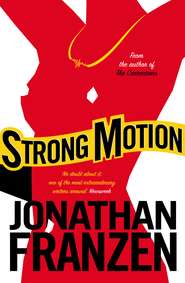По всем вопросам обращайтесь на: info@litportal.ru
(©) 2003-2024.
✖
Freedom
Настройки чтения
Размер шрифта
Высота строк
Поля
On the chance that, regarding Patty’s parents, a note of complaint or even outright blame has crept into these pages, the autobiographer here acknowledges her profound gratitude to Joyce and Ray for at least one thing, namely, their never encouraging her to be Creative in the Arts, the way they did with her sisters. Joyce and Ray’s neglect of Patty, however much it stung when she was younger, seems more and more benign when she considers her sisters, who are now in their early forties and living alone in New York, too eccentric and/or entitled-feeling to sustain a long-term relationship, and still accepting parental subsidies while struggling to achieve an artistic success that they were made to believe was their special destiny. It turns out to have been better after all to be considered dumb and dull than brilliant and extraordinary. This way, it’s a pleasant surprise that Patty is even a little bit Creative, rather than an embarrassment that she isn’t more so.
A great thing about the young Walter was how much he wanted Patty to win. Where Eliza had once mustered unsatisfying little driblets of partisanship on her behalf, Walter gave her full-bore infusions of hostility toward anybody (her parents, her siblings) who made her feel bad. And since he was so intellectually honest in other areas of life, he had excellent credibility when he criticized her family and signed on with her questionable programs of competing with it. He may not have been exactly what she wanted in a man, but he was unsurpassable in providing the rabid fandom which, at the time, she needed even more than romance.
It’s easy now to see that Patty would have been well advised to take some years to develop a career and a more solid post-athletic identity, get some experience with other kinds of men, and generally acquire more maturity before embarking on being a mother. But even though she was finished as an intercollegiate player, there was still a shot clock in her head, she was still in the buzzer’s thrall, she needed more than ever to keep winning. And the way to win—her obvious best shot at defeating her sisters and her mother—was to marry the nicest guy in Minnesota, live in a bigger and better and more interesting house than anybody else in her family, pop out the babies, and do everything as a parent that Joyce hadn’t. And Walter, despite being an avowed feminist and an annually renewing Student-level member of Zero Population Growth, embraced her entire domestic program without reservation, because she really was exactly what he wanted in a woman.
They got married three weeks after her college graduation—almost exactly a year after she’d taken the bus to Hibbing. It had fallen to Walter’s mom, Dorothy, to frown and express concern, in her soft and tentative and nevertheless quite stubborn way, about Patty’s determination to be married at the Hennepin County courthouse instead of in a proper wedding hosted by her parents in Westchester. Wouldn’t it be better, Dorothy softly wondered, to include the Emersons? She understood that Patty wasn’t close to her family, but, still, mightn’t she later come to regret excluding them from such a momentous occasion? Patty tried to paint Dorothy a picture of what a Westchester wedding would be like: two hundred or so of Joyce and Ray’s closest friends and Joyce’s biggest-ticket campaign contributors; pressure from Joyce on Patty to select her middle sister as the maid of honor and to let her other sister do an interpretive dance during the ceremony; unbridled champagne intake leading Ray to make some joke about lesbians within earshot of Patty’s basketball friends. Dorothy’s eyes welled up a little, maybe in sympathy with Patty or maybe in sadness at Patty’s coldness and harshness on the subject of her family. Wouldn’t it be possible, she softly persisted, to insist on a small private ceremony in which everything would be exactly how Patty wanted it?
Not the least of Patty’s reasons to avoid a wedding was the fact that Richard would have to be Walter’s best man. Her thinking here was partly obvious and partly had to do with her fear of what would happen if Richard ever met her middle sister. (The autobiographer will now finally man up and say the sister’s name: Abigail.) It was bad enough that Eliza had had Richard; to see him hooking up with Abigail, even for one night, would have just about finished Patty off. Needless to say, she didn’t mention this to Dorothy. She said she guessed she just wasn’t a very ceremonial person.
As a concession, she did take Walter to meet her family in the spring before she married him. It pains the autobiographer to admit that she was a tiny bit embarrassed to let her family see him, and, worse, that this may have been another reason why she didn’t want a wedding. She loved him (and does love him, does love him) for qualities that made abundant sense to her in their two-person private world but weren’t necessarily apparent to the sort of critical eye that she was sure her sisters, Abigail in particular, would train on him. His nervous giggle, his too-readily reddening face, his very niceness: these attributes were dear to her in the larger context of the man. A source of pride, even. But the unkind part of her, which exposure to her family always seemed to bring out in force, couldn’t help regretting that he wasn’t six-foot-four and very cool.
Joyce and Ray, to their credit, and perhaps in their secret relief that Patty had turned out to be heterosexual (secret because Joyce, for one, stood ready to be strenuously Welcoming to Difference), were on their very best behavior. Hearing that Walter had never been to New York, they became gracious ambassadors to the city, urging Patty to take him to museum exhibitions that Joyce herself had been too busy in Albany to have seen, and then meeting up with them for dinner at Times-approved restaurants, including one in SoHo, which was then still a dark and exciting neighborhood. Patty’s worry that her parents would make fun of Walter gave way to the worry that Walter would take their side and not see why they were unbearable to her: would begin to suspect that the real problem was Patty, and would lose that blind faith in her goodness which already, in less than a year with him, she had rather desperately come to count on.
Thankfully Abigail, who was a high-end restaurant hound and insisted on turning several of the dinners into awkward fivesomes, was in peak disagreeable form. Unable to imagine people gathering for some reason besides listening to her, she prattled about the world of New York theater (by definition an unfair world since she had made no progress in it since her understudy breakthrough); about the “sleazy slimeball” Yale professor with whom she’d had insuperable Creative differences; about some friend of hers named Tammy who’d self-financed a production of Hedda Gabler in which she (Tammy) had brilliantly starred; about hangovers and rent control and disturbing third-party sexual incidents that Ray, refilling and refilling his own wineglass, demanded every prurient detail of. Midway through the final dinner, in SoHo, Patty got so fed up with Abigail’s shanghaiing of the attention that ought to have been lavished on Walter (who had politely attended to every word of Abigail’s) that she flat-out told her sister to shut up and let other people talk. There ensued a bad interval of silent manipulation of tableware. Then Patty, making comical gestures of drawing water from a well, got Walter talking about himself. Which was a mistake, in hindsight, because Walter was passionate about public policy and, not knowing what real politicians are like, believed that a state assemblywoman would be interested in hearing his ideas.
He asked Joyce if she was familiar with the Club of Rome. Joyce confessed that she was not. Walter explained that the Club of Rome (one of whose members he’d invited to Macalester for a lecture two years earlier) was devoted to exploring the limits of growth. Mainstream economic theory, both Marxist and free-market, Walter said, took for granted that economic growth was always a positive thing. A GDP growth rate of one or two percent was considered modest, and a population growth rate of one percent was considered desirable, and yet, he said, if you compounded these rates over a hundred years, the numbers were terrible: a world population of eighteen billion and world energy consumption ten times greater than today’s. And if you went another hundred years, with steady growth, well, the numbers were simply impossible. So the Club of Rome was seeking more rational and humane ways of putting the brakes on growth than simply destroying the planet and letting everybody starve to death or kill each other.
“The Club of Rome,” Abigail said. “Is that like an Italian Playboy Club?”
“No,” Walter said quietly. “It’s a group of people who are challenging our preoccupation with growth. I mean, everybody is so obsessed with growth, but when you think about it, for a mature organism, a growth is basically a cancer, right? If you have a growth in your mouth, or a growth in your colon, it’s bad news, right? So there’s this small group of intellectuals and philanthropists who are trying to step outside our tunnel vision and influence government policy at the highest levels, both in Europe and the Western Hemisphere.”
“The Bunnies of Rome,” Abigail said.
“Nor-fock-a Virginia!” Ray said in a grotesque Italian accent.
Joyce loudly cleared her throat. En famille, when Ray became silly and dirty because of wine, she could simply retreat into her private Joycean reveries, but in her future son-in-law’s presence she had no choice but to be embarrassed. “Walter is talking about an interesting idea,” she said. “I’m not particularly familiar with this idea, or with this … club. But it’s certainly a very provocative perspective on our world situation.”
Walter, not seeing the little neck-slicing gesture that Patty was making, pressed on. “The whole reason we need something like the Club of Rome,” he said, “is that a rational conversation about growth is going to have to begin outside the ordinary political process. Obviously you know this yourself, Joyce. If you’re trying to get elected, you can’t even talk about slowing the growth rate, let alone reversing it. It’s total political poison.”
“Safe to say,” Joyce said with a dry laugh.
“But somebody has to talk about it, and try to influence policy, because otherwise we’re going to kill the planet. We’re going to choke on our own multiplication.”
“Speaking of choking, Daddy,” Abigail said, “is that your private bottle there, or can we have some, too?”
“We’ll get another,” Ray said.
“I don’t think we need another,” Joyce said.
Ray raised his Joyce-stilling hand. “Joyce—just—just—calm down. We’re fine here.”
Patty, with a frozen smile, sat looking at the glamorous and plutocratic parties at other tables in the restaurant’s lovely discreet light. There was, of course, nowhere better in the world to be than New York City. This fact was the foundation of her family’s satisfaction with itself, the platform from which all else could be ridiculed, the collateral of adult sophistication that bought them the right to behave like children. To be Patty and sitting in that SoHo restaurant was to confront a force she had not the slightest chance of competing with. Her family had claimed New York and was never going to budge. Simply never coming here again—just forgetting that restaurant scenes like this even existed—was her only option.
“You’re not a wine drinker,” Ray said to Walter.
“I’m sure I could become one if I wanted,” Walter said.
“This is a very nice amarone, if you want to try a little.”
“No, thank you.”
“You sure?” Ray waved the bottle at Walter.
“Yes he’s sure!” Patty cried. “He’s only said it every night for the last four nights! Hello? Ray? Not everybody wants to be drunk and disgusting and rude. Some people actually enjoy having an adult conversation instead of making sex jokes for two hours.”
Ray grinned as if she’d been amusing. Joyce unfolded her half-glasses to examine the dessert menu while Walter blushed and Abigail, with a spastic neck-twist and a sour frown, said, “ ‘Ray’? ‘Ray’? We call him ‘Ray’ now?”
The next morning, Joyce quaveringly told Patty: “Walter is much more—I don’t know if the right word is conservative, or what, I guess not exactly conservative, although, actually, from the standpoint of democratic process, and power flowing upward from the people, and prosperity for all, not exactly autocratic, but, in a way, yes, almost conservative—than I’d expected.”
Ray, two months later, at Patty’s graduation, with a poorly suppressed snicker, said to Patty: “Walter got so red in the face about that growth stuff, my God, I thought he was going to have a stroke.”
And Abigail, six months after that, at the only Thanksgiving that Patty and Walter were ever foolish enough to celebrate in Westchester, said to Patty: “How are things going with the Club of Rome? Have you guys joined the Club of Rome yet? Have you learned the passwords? Have you sat in the leather chairs?”
Patty, at LaGuardia Airport, sobbing, said to Walter: “I hate my family!”
And Walter valiantly replied: “We’ll make our own family!”
Poor Walter. First he’d set aside his acting and filmmaking dreams out of a sense of financial obligation to his parents, and then no sooner had his dad set him free by dying than he teamed up with Patty and set aside his planet-saving aspirations and went to work for 3M, so that Patty could have her excellent old house and stay home with the babies. The whole thing happened almost without discussion. He got excited about the plans that excited her, he threw himself into renovating the house and defending her against her family. It wasn’t until years later—after Patty had begun to Disappoint him—that he became more forgiving of the other Emersons and insisted that she was the lucky one, the only Emerson to escape the shipwreck and survive to tell the tale. He said that Abigail, who’d been left stranded to scavenge emotional meals on an island of great scarcity (Manhattan Island!), should be forgiven for monopolizing conversations in her attempt to feed herself. He said that Patty should pity her siblings, not blame them, for not having had the strength or the luck to get away: for being so hungry. But this all came much later. In the early years, he was so fired up about Patty, she could do no wrong. And very nice years they were.
Walter’s own competitiveness wasn’t family-oriented. By the time she met him, he’d already won that game. At the poker table of being a Berglund, he’d been dealt every ace except maybe looks and ease with women. (His older brother—who is currently on his third young wife, who is working hard to support him—got that particular ace.) Walter not only knew about the Club of Rome and read difficult novels and appreciated Igor Stravinsky, he could also sweat a copper pipe joint and do finish carpentry and identify birds by their songs and take good care of a problematic woman. He was so much his family’s winner that he could afford to make regular voyages back to help the others.
“I guess now you’re going to have to see where I grew up,” he’d said to Patty outside the Hibbing bus station, after she’d aborted the road trip with Richard. They were in his dad’s Crown Victoria, which they’d fogged up with their hot and heavy breathing.
“I want to see your room,” Patty said. “I want to see everything. I think you’re a wonderful person!”
Hearing this, he had to kiss her for another long while before resuming his anxiety. “Be that as it may,” he said, “I’m still embarrassed to take you home.”
“Don’t be embarrassed. You should see my home. It’s a freak show.”
“Yeah, well, this is not anything as interesting as that. This is just your basic Iron Range squalor.”
“So let’s go. I want to see it. I want to sleep with you.”
“That sounds great,” he said, “but I think my mom might be uncomfortable with it.”
“I want to sleep near you. And then I want to have breakfast with you.”
“That we can arrange.”
In truth, the scene at the Whispering Pines was sobering to Patty and touched off a moment of doubt about what she’d done by coming to Hibbing; it unsettled that self-contained state of mind in which she’d run to a guy who physically didn’t do for her what his best friend did. The motel wasn’t so bad from the outside, and there was a non-depressing number of cars in the parking lot, but the living quarters, behind the office, were indeed a long way from Westchester. They lit up a whole previously invisible universe of privilege, her own suburban privilege; she had an unexpected pang of homesickness. The floors were spongily carpeted and sloped perceptibly toward the creek in back. In the living/dining area was a hubcap-sized, extensively crenellated ceramic ashtray within easy reach of the davenport where Gene Berglund had read his fishing and hunting magazines and watched whatever programming the motel’s antenna (rigged, as she saw the next morning, to the top of a decapitated pine tree behind the septic field) was able to pull down from stations in the Twin Cities and Duluth. Walter’s little bedroom, which he’d shared with his younger brother, was at the bottom of the downslope and permanently damp with creek vapors. Running down the middle of the carpeting was a line of gummy residue from the duct tape that Walter had put down as a child to demarcate his private space. Paraphernalia from his striving childhood were still ranged along the far wall: Boy Scout handbooks and awards, a complete set of abridged presidential biographies, a partial set of World Book Encyclopedia volumes, skeletons of small animals, an empty aquarium, stamp and coin collections, a scientific thermometer/barometer with wires leading out a window. On the room’s warped door was a yellowed homemade No Smoking sign, lettered in red crayon, its N and its S unsteady but tall in their defiance.
“My first act of rebellion,” Walter said.
“How old were you?” Patty said.
“I don’t know. Maybe ten. My little brother had bad asthma.”
Outside, the rain was coming down hard. Dorothy was asleep in her room, but Walter and Patty were both still buzzing with lust. He showed her the “lounge” that his dad had operated, the impressive stuffed walleye mounted on the wall, the birch-plywood bar that he’d helped his dad build. Until recently, when he had to be hospitalized, Gene had stood smoking and drinking behind this bar in the late afternoon, waiting for his friends to get off work and give him business.
















